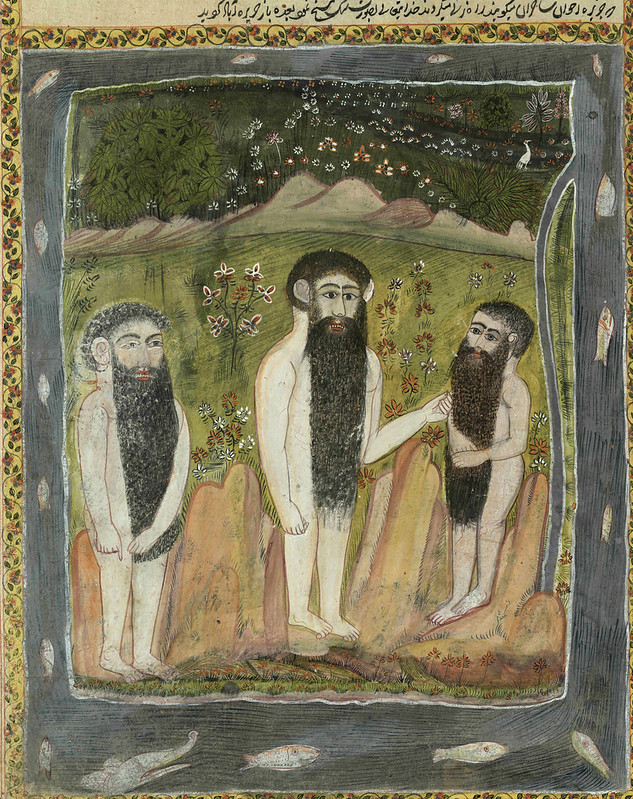Хипстеры бородатые. Чудеса сотворенного и диковинки существующего
Средневековая исламская наука

Закарийа' ал-Казвини. «Чудеса сотворенного и диковинки существующего». Остров Хасарат, населен невысокими, приземистыи людьми с бородами до колен и большими ушами, знаменит шелком. Сент-Эндрюсский университет, Шотландия / Book of the Wonders of the Age. 17-18th c?. The University of St Andrews, ms32(o), f.102a: island of Hasarat, short, wide people with beards down to their knees, big ears, famous for silk. Source
Картинка из рукописи, хранящейся в Сент-Эндрюсском университете, Шотландия. Изготовлена в XVII-XVIII в., язык персидский. 130 бумажных листов размером 40х30 см. Состоит их двух частей, скрепленных в один том. Первая часть - сокращенный вариант «Жизни животных» аль-Дамири (1341-1405). Вторая часть - выписки из сочинения Закарийа' ал-Казвини, жившего в XIII веке.
Бородачи - иллюстрация ко второй части: труду, автор которого Абу Йахйа Закарийа' ибн Мухаммад ибн Махмуд ал-Казвини (ок.600/1203-682/1283). Сочинения Закарийа' ал-Казвини условно называют «Космографией» и «Географией».
2.

Book of the Wonders of the Age. 17-18th c?. The University of St Andrews, ms32(o), f.102a: island of Hasarat, short, wide people with beards down to their knees, big ears, famous for silk. Source
Это две компиляции, совершенно самостоятельные, но все же тесно связанные между собой. Космография носит название «'Ад-жа'иб ал-махлукат ва гара'иб ал-мауджудат» («Чудеса сотворенного и диковинки существующего»). В ней рассказывается о мире небесном: планеты, звезды, небожители и земном: минералы, растения, животные, человек. Во вторую часть включены и чисто географические сведения, частично повторяющиеся в «Географии». Рукописи «Китаб 'аджа'иб ал-махлукат» сохранились в Дамаске, Каире, а в Европе - в Берлине, Вене, Гамбурге, Готе, Дрездене, Кракове, Санкт-Петербурге. Установлено наличие четырех редакций этого сочинения.
Менее распространенная «География» более богата историческими данными: в ней историческая и биографическая информация вкраплена среди географических сообщений. Иногда географические названия или биографические сведения о тех или иных лицах встречаются здесь впервые. Это сочинение известно в двух редакциях, каждая из которых имеет свое заглавие. Первая называется [46] «'Ад-жа'иб ал-булдан» («Чудеса стран») и относится к 661/1263 г. Вторая, значительно расширенная по сравнению с первой, носит название «Асар ал-билад ва ахбар ал-'ибад» («Достопамятности стран и сообщения о рабах Аллаха»). Она датируется 674/1275 г.
[The Book of the Wonders of the Age. University Library Special Collections, University of St Andrews, ms32(o)]
The Book of the Wonders of the Age. University Library Special Collections, University of St Andrews, ms32(o)
Part of a compilation, comprising two works in Persian, profusely illustrated throughout, front and back covers stamped with stylised sun-head, rebound in 1848. Numbered in Persian. Catchwords.
Part of a compilation, comprising two works in Persian, profusely illustrated throughout, front and back covers stamped with stylised sun-head, rebound in 1848. Numbered in Persian. Catchwords.
f2a. Date of 25 ramazan 1263 within a colourful inscription: 'One thousand beautiful and elegant masked faces are in this society but you are the only one with the true face which is beautiful'.
1. (fol. 3-89b): 'Ain al-Haiyat, or The Substance of the Lives, an abbreviation in Arabic of the famous Haiyat al-Haiyawan or Lives of the Animals of Damiri. The abbreviation was written by Damamini. 'The fifth treatise of the second volume of the Book of Wonders of the Age, or an account of the conditions on land- and sea-animals, comprising a preface and 28 chapters, according to the letters of the alphabet, with the names of animals and descriptions of their peculiarities and an explanation.' The writer has left the translation unfinished or has failed to transcribe completely an earlier Persian version, as it ends with the male partridge instead of ending with the queen-bee.
2. (fol. 91-130): Extracts from the 'Seven Seas' section of 'Aja'ib al-makhluqat (Wonders of Creation) of Qazwini. Cites as authorities 'Abdarrahman ibn Harun al-Maghribi and Abu Hamid al-Andalusi. Picture book with only a line or two of text on each page. Names of places given in Arabic but text in Persian.
The writer has left this part unfinished, some of the illustrations are sketched out but incomplete.
Extent 1 volume, 130ff.
Creator Name: Damiri, Damamini, Qazwini
Admin History: Muhammad Ibn Musa Kamal Ad-din Ad-damiri (1341-1405) was born in Egypt at Damira near Damietta. He became a theologian and an expert in Islamic jurisprudence, as well as Arabic philology, teaching in Cairo and at the mosque of el-Azhar and producing works on Islamic law and natural history. His most famous writing was the Haiyat al-Haiyawan or Lives of the Animals, a compilation of works by many authors to give copious details on the 931 animals mentioned in the Koran, including folklore, proverbs, medical uses and meaning of names.
Damamini was an Egyptian who travelled to the Yemen and then to India, completing his work in Gujarat in AH823/AD1420.
Zakariya' ibn Muhammad al-Qazwini (d.1283), was a Persian physician from Qazvin. He travelled around the Near East serving as a legal expert and judge, including in Baghdad for the governor, 'Ata-Malik Juwayni. Qazwini's popular cosmology was dedicated to the governor. This treatise was first written in Arabic, entitled 'Aja'ib al-makhluqat wa-ghara'ib al-mawjudat (Marvels of Things Created and Miraculous Aspects of Things Existing). He also wrote a geographical dictionary, Athar al-bilad wa-akhbar al-'ibad (Monument of Places and History of God's Bondsmen).
Language: Persian
Physical Description: Paper: 16.5' x 12'.
Источники, дополнительно:
University Library Special Collections, University of St Andrews, ms32(o)
Закарийа' ал-Казвини на сайте «Восточная литература»: Казвини, Закария. Публикация 1976 г. Космография. Публикация 2004 г. Публикация 2002 г. Предисловие. Космография. География.